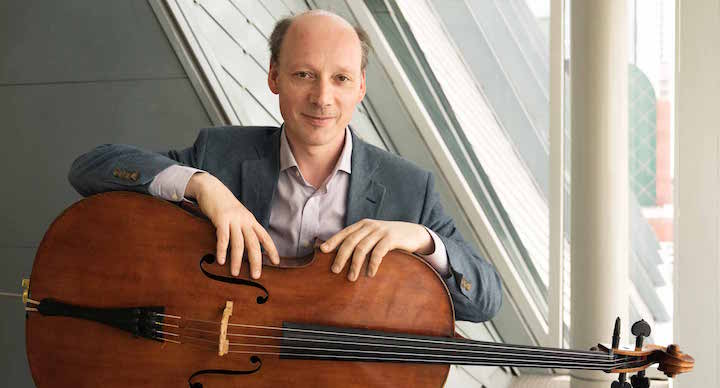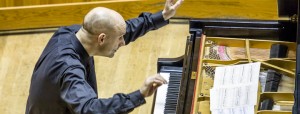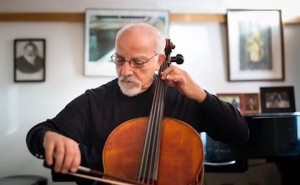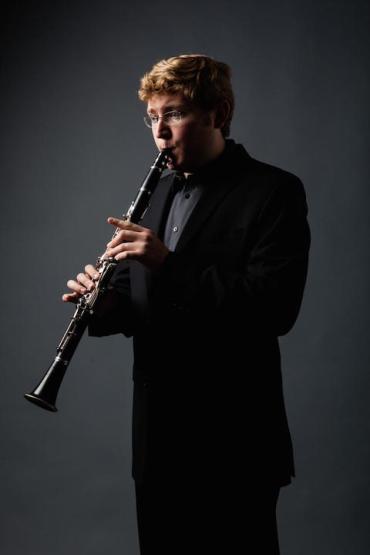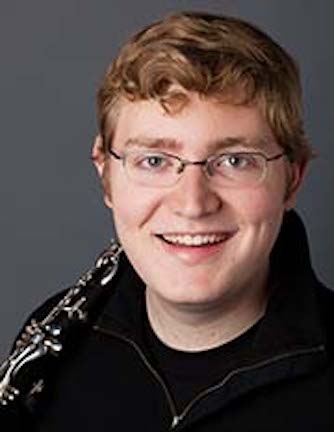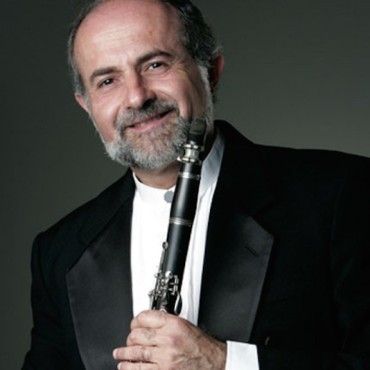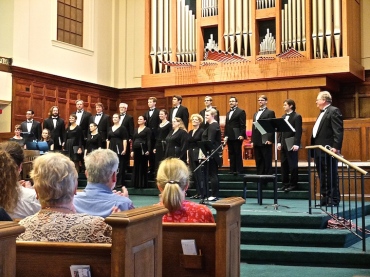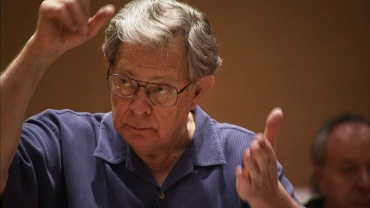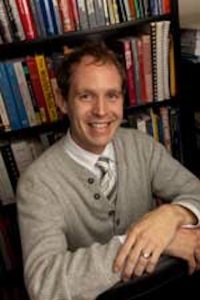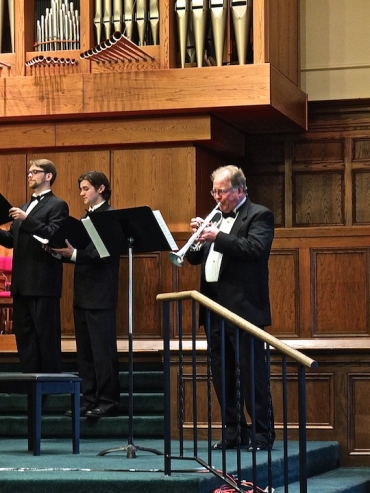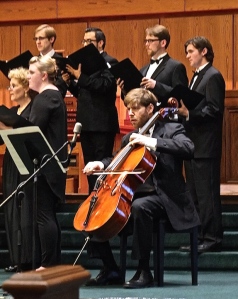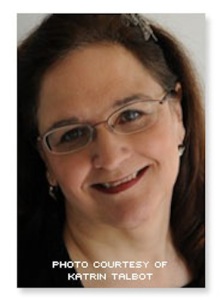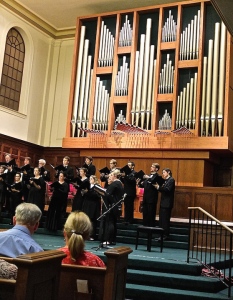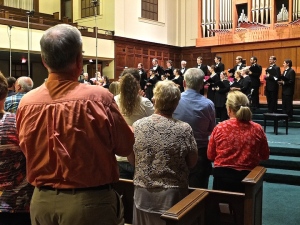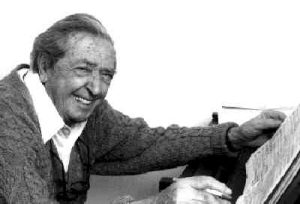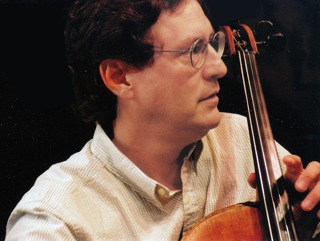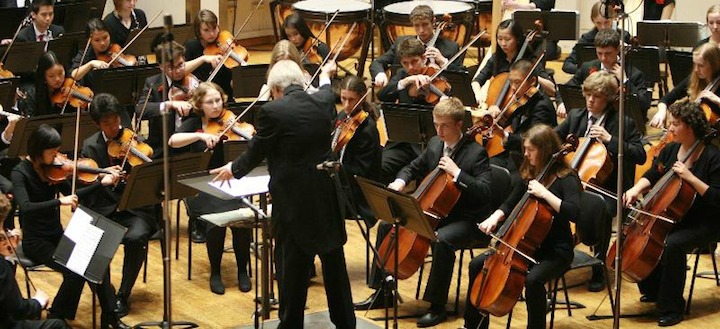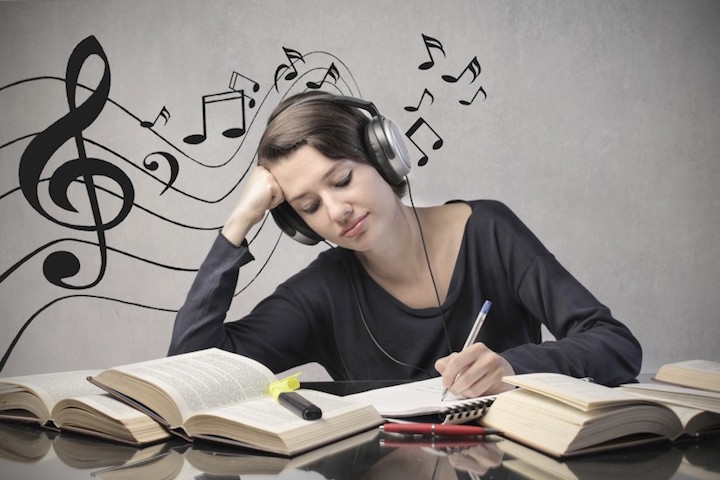The Well-Tempered Ear
Classical music: TONIGHT at 7:30 p.m., guest artist Clive Greensmith of the Tokyo String Quartet and USC will give a FREE cello recital at the UW-Madison
2 Comments
IF YOU LIKE A CERTAIN BLOG POST, PLEASE FORWARD A LINK TO IT OR SHARE IT (not just “Like” it) ON FACEBOOK. Performers can use the extra exposure
By Jacob Stockinger
If you like cello music – which to some ears sounds especially appropriate in autumn – you might be interested in an event tonight.
One of the most distinguished chamber music cellists in the world has been at the University of Wisconsin’s Mead Witter School of Music over the weekend for a three-day residency involving UW string and piano students and members of the Wisconsin Youth Symphony Orchestras (WYSO).
He is Clive Greensmith (below) who played with the acclaimed Tokyo String Quartet from 1999 until it disbanded in 2013 and who now teaches at the Colburn School of Music at the University of Southern California in Los Angeles.
Greensmith’s residency of lectures, demonstrations and master classes culminates TONIGHT at 7:30 p.m. in Mills Hall with a FREE recital that also features UW piano professor Christopher Taylor, UW cello professor Uri Vardi and the UW Cello Choir.
The appealing program includes the Sonata for Two Cellos by Luigi Boccherini; “Silent Woods” by Antonin Dvorak and the Sonata No. 2 in F Major, Op. 99, by Johannes Brahms. (You can hear the slow movement of the Brahms sonata, played by the late cellist Jacqueline du Pré and pianist Daniel Barenboim, in the YouTube video at the bottom.)
For more information about Greensmith, his UW residency, his teaching and the concert tonight, go to: https://www.music.wisc.edu/event/guest-artist-recital-clive-greensmith-cello/
To to learn much more about Greensmith, including his recordings and latest projects, go to his homepage web site at: http://www.clivegreensmith.com
Tags: #AntoninDvorak, #BlogPost, #BlogPosting, #CelloChoir, #CelloMusic, #CelloSonata, #ChamberMusic, #ChamberMusicians, #ChristopherTaylor, #CliveGreensmith, #ColburnSchoolofMusic, #FacebookPost, #HomePage, #JacquelineduPré, #JohannesBrahms, #LosAngeles, #LuigiBoccherini, #MeadWitterSchoolofMusic, #PianoAccompaniment, #PianoMusic, #SilentWoods, #StringMusic, #StringQuartet, #TokyoStringQuartet, #UniversityofSouthernCalifornia, #UniversityofWisconsin, #UniversityofWisconsin-Madison, #UriVardi, #WisconsinYouthSymphonyOrchestras, Arts, Autumn, Beethoven, Boccherini, Cello, cello choir, Chamber music, Christopher Taylor, Classical music, Clive Greensmith, Coburn School of Music, Colburn School of Music, Compact Disc, composer, Concert, demonstration, distinguished, Dvorak, ear, event, Facebook, fall, free, information, Jacob Stockinger, Jacqueline du Pré, Johannes Brahms, lecture, Los Angeles, Ludwig van Beethoven, Madison, master class, masterclass, Mead Witter School of Music, Music, performer, Piano, play, player, professor, program, project, recital, recording, residency, Silent Woods, Sonata, String quartet, strings, Tokyo, Tokyo String Quartet, tonight, UCLA, United States, University of Southern California, University of Wisconsin-Madison School of Music, University of Wisconsin–Madison, Uri Vardi, USC, Viola, Violin, web site, Wisconsin Youth Symhony Orchestras, WYSO, YouTube
Classical music: The Madison Summer Choir performs a program of music that expresses suffering, oppression and resistance this Wednesday night at UW-Madison
Leave a Comment
By Jacob Stockinger
The Madison Summer Choir (below) will present its ninth annual concert, “Art: The Timeless Resistance – The Voice of the Oppressed,” on this coming Wednesday night, June 28, 2017 at 7:30 p.m. in Mills Hall of the UW-Madison’s Mosse Humanities Building, 455 N. Park St.
The suggested ticket donation is $15.
The concert brings together a variety of works that have served as an outlet for suffering peoples, works that gave them a voice where they otherwise had none.
The concert will begin with Sometimes I Feel Like a Motherless Child, a traditional Spiritual arranged by Jay Althouse.
This is followed by Miriam’s Song of Triumph, composed by Franz Schubert (1797-1828) very near the end of his short life to a German text (Mirjams Siegesgesang) by Austrian poet Franz Grillparzer. The text and music describe the Exodus and the celebration of Miriam and the Israelites after fleeing Egypt. (You can hear the work in the YouTube video at the bottom.)
The first half ends with two shorter works again in English, There Will be Rest, a setting of a poem by Sara Teasdale by Frank Ticheli (below top), of the University of Southern California, and How Can I Keep from Singing? by Baptist minister and American literature professor Robert Lowry (1826-1899, below bottom), as arranged in 2010 by Taylor Davis.
The choir will be accompanied by oboist Malia Huntsman and concertmaster Elspeth Stalter-Clouse.
The second half of the program is devoted to the Mass in C (1807) by Ludwig van Beethoven (1770-1827), and will be performed with full orchestra.
The choir was founded by UW-Madison graduate and artistic director Ben Luedcke (below) – who now teaches at Monmouth College — after the UW Summer Choir was eliminated due to budget constraints.
The Madison Summer Choir is an auditioned choir of 60 to 70 voices that performs a cappella works, piano-accompanied works and choral-orchestral works in a short season at the beginning of summer.
This student and community singing opportunity and tradition continue thanks to the extraordinary efforts of our singers and our audience to fund our complete existence in six weeks.
Go to madisonsummerchoir.org to learn more.
Tags: a cappella, American, Art, Arts, Austria, Baptist, Beethoven, budget, choral music, Classical music, community, concertmaster, donation, Exodus, Frank Ticheli, Franz Schubert, Grillparzer, group, hymn, Israel, Israelite, Jacob Stockinger, literature, Ludwig van Beethoven, Madison, Madison Summer Choir, mass, minister, Miriam, Monmouth College, Music, Oboe, oppression, Orchestra, Piano, poet, Poetry, preacher, professor, resistance, Robert Lowry, Sara Teasdale, Singing, song, spiritual, Student, suffer, suffering, summer, symphony, ticket, time, triumph, United States, University of Southern California, University of Wisconsin-Madison School of Music, University of Wisconsin–Madison, Violin, voice, YouTube
Classical music: Meet Joseph Morris, principal clarinet of the Madison Symphony Orchestra. He solos in a concerto by Aaron Copland this weekend.
1 Comment
By Jacob Stockinger
Conductor John DeMain and the Madison Symphony Orchestra (MSO) will open the MSO’s 90th season this coming weekend.
The program includes the “Leonore” Overture No. 3 by Ludwig van Beethoven; the Clarinet Concerto by Aaron Copland with MSO principal clarinet Joseph Morris (below, in a photo by Cheryl Savan) as soloist; and the Symphony No. 4 by Peter Ilyich Tchaikovsky.
The concerts in Overture Hall in the Overture Center, 201 State St., are Friday at 7:30 p.m.; Saturday at 8 p.m.; and Sunday at 2:30 p.m.
One hour before each performance, Michael Allsen, UW-Whitewater Professor of Music, MSO Trombonist & MSO program notes annotator, will lead a 30-minute Prelude Discussion in Overture Hall to enhance concertgoers’ understanding and listening experience.
More background on the music can also be found in the Program Notes at: http://www.madisonsymphony.org/tchaikovsky
Single Tickets, $16 to $85 each, can be purchased at www.madisonsymphony.org/singletickets, through the Overture Center Box Office at 201 State Street, or by calling the Box Office at (608) 258-4141.
Groups of 15 or more can save 25 percent by calling the MSO office at (608) 257-3734.
For more information visit, www.madisonsymphony.org/groups
Student rush tickets can be purchased in person on the day of the concert at the Overture Box Office at 201 State Street. Students must show a valid student ID and can receive up to two $12 or $15 tickets. More information is at: www.madisonsymphony.org/studentrush. Students can receive 20% savings on seats in select areas of the hall on advance ticket purchases.
Seniors age 62 and up receive 20% savings on advance and day-of-concert ticket purchases in select areas of the hall.
Discounted seats are subject to availability, and discounts may not be combined.
Find more information at http://www.madisonsymphony.org.
Clarinetist Joe Morris (below, in a photo by Jennifer Morgan) recently agreed to an email Q&A with The Ear:
Could you briefly introduce yourself to readers and give some highlights of your education and career?
I grew up in Northern California before heading to Los Angeles where I did my undergraduate degree in Clarinet Performance at the University of Southern California Thornton School of Music. It was there that I began my studies with Yehuda Gilad (below), who has been, by far, the highlight of my musical education.
After graduating I continued my studies at the Colburn Conservatory of Music, where I received a Professional Studies Certificate in 2014.
Some highlights of my education included summers at the Aspen Music Festival, the National Repertory Orchestra and two summers at the Music Academy of the West studying with Richie Hawley.
I won the MSO’s Principal Clarinet audition out of 44 applicants in 2013 when I was 22 and still studying at Colburn.
This past winter, I joined the Sarasota Opera Orchestra in Florida as their Principal Clarinetist and I have spent the past two summers at the Clarinet Faculty at the Luzerne Music Center in the Adirondack region of New York.
Other highlights of the last few years have been returning to Colburn to perform John Adams’ Gnarly Buttons for solo clarinet and chamber orchestra with Mr. Adams conducting, and competing in the fifth Carl Nielsen International Clarinet Competition in Odense, Denmark.
How have your years in Madison with the MSO been?
I have enjoyed the past two seasons in Madison very much! Madison is a wonderful city and it has been very fun to get to explore all that it has to offer.
I love the sense of community in Madison and especially how that extends to the MSO (below). My colleagues in the orchestra are fantastic players as well as wonderful people. Everyone brings out the best in one another throughout the rehearsal and performance process.
It has also been a huge honor to receive the support of the MSO audiences who never cease to amaze me with their knowledge and enthusiasm for what we do on stage.
What was your Aha! moment –- perhaps a performer or a specific performance or a piece of music — when you first knew you wanted to be a professional musician?
When I was 15, I spent a summer at the Interlochen Arts Camp (below) in Michigan. After a summer of intense study, I realized that I had to pursue music as a career. More than anything it was the shared experience with my peers, who felt the same intensity for music that I did, that brought me to that conclusion.
At the end of every summer at Interlochen the entire camp performs Franz Liszt’s Les Preludes together in an enormous musical collaboration. That specific performance will always remain in my memory as something that laid the foundation for my decision to go into music.
How do you compare the Copland Concerto to other well-known clarinet concertos by Wolfgang Amadeus Mozart, Carl Nielsen and Gerald Finzi (which you performed with the Middleton Community Orchestra). And what would you like listeners to know about the Copland Clarinet Concerto in terms of its structure, technical difficulties, melodies and harmonies, whatever?
One thing that always interests me about works for the clarinet is whom the composer had in mind when they wrote it. For Mozart, that was Anton Stadler; for Nielsen, it was Aage Oxenvad; for Johannes Brahms, it was Richard Muhlfeld; and for Copland, it was Benny Goodman. And Benny Goodman’s style, especially as a big band jazz musician, is extremely apparent in this concerto.
It opens with a first movement that is more typically Copland (below top) than Goodman (below bottom) — with huge interval leaps in the solo line over truly gorgeous string writing. It reminds me of the opening passage of his “Appalachian Spring,” which, coincidentally, was the first piece I ever performed with the MSO.
Following the lyrical “first movement” is an extended cadenza where Goodman starts to take over as the piece morphs into something much more lively and jazz based. After the cadenza the orchestra comes back in for a sort of “second movement” that eventually comes to a very frenzied and glissando-laden finish.
(You can hear the first movement played by Benny Goodman with composer Aaron Copland conducting the Los Angeles Philharmonic in a YouTube video at the bottom.)
Apart from concertos and chamber music specifically written for the clarinet, what orchestral works have your favorite clarinet parts?
I love the way the clarinet timbre can emerge from the orchestra with a sort of floating quality in a lyrical passage. For that reason two of my favorite orchestral works for the clarinet are Sergei Rachmaninoff’s Symphony No. 2 and Ottorino Respighi’s “Pines of Rome,” which the Madison Symphony Orchestra (below) will perform at its April 29-May 1 concerts.
What else would you like to say?
I’m very excited for this upcoming concerto both because of the opportunity to perform this concerto with my marvelous colleagues, and also to then get to sit in the orchestra with them all for Tchaikovsky’s Symphony No. 4.
Tags: Aaron Copland, Appalachian Spring, Arts, Aspen Music Festival, Beethoven, Benny Goodman, big band, Carl Nielsen, Chamber music, clarinet, Classical music, composer, concerto, conduct, Denmark, Fidelio, Gerald Finzi, harmony, Interlochen, Jacob Stockinger, Jazz, Johannes Brahms, John Adams, John DeMain, Leonore, Leonore Overture No. 3, Les Preludes, Liszt, Los Angeles Philharmonic, Ludwig van Beethoven, Madison, Madison Symphony Orchestra, melody, Middleton Community Orchestra, Mozart, Music, Music Academy of the West, Orchestra, Overture Center, Pines of Rome, Pyotr Ilyich Tchaikovsky, Respighi, structure, swing, Tchaikovsky, Thornton School of Music, United States, University of Southern California, University of Wisconsin-Madison School of Music, University of Wisconsin–Madison, USC, Wolfgang Amadeus Mozart, Yehuda Gilad, YouTube
Classical music: Here are seven big things The Ear liked about the latest concert by the Madison Choral Project and two small things he did not like. Go this afternoon and see if you agree.
3 Comments
By Jacob Stockinger
On Friday night, The Ear attended the latest concert by the estimable Madison Choral Project. He was very glad he did. It was terrific. You should go hear it.
The concert was called “Music of Our Time” and was programmed and conducted by the legendary Grammy-nominated conductor Dale Warland (below top). Edgewood College professor Albert Pinsonneault (below bottom), who just got a new job at Northwestern University near Chicago and who founded and directs the Madison Choral Project, studied under Warland.
It was and will remain a memorable event, and I encourage music fans to attend a repeat performance this afternoon at 2:30 p.m. at the First Congregational United Church of Christ, 1609 University Ave. (Free parking is available two blocks west at the UW Foundation.)
Tickets are $20 general admission; $10 student admission; and $50 for preferred seating to support the outstanding organization.
For more information, visit http://themcp.org
Here is The Ear’s review in the form of points he liked and didn’t like:
SEVEN THINGS THE EAR LIKED ABOUT THE CONCERT:
- The program was not too long, yet it featured a wide variety of repertoire, texts and composers.
- The chorus sang with seemingly exemplary diction in English, Latin and Russian.
- The many a cappella portions were broken up by adding other instruments. UW-Madison professor John Aley (below top) played the trumpet, especially in a haunting finale where he played from a distance. Eric Miller (below bottom) played the cello with energy, sensitivity and lyricism.
- UW-Madison piano professor Martha Fischer (below) played with mastery, never too loudly or too softly. She demonstrated the art of blending. Little wonder that she heads the collaborative piano faculty – that is what used to be called the art of “accompanying” – at the UW-Madison School of Music.
- The chorus showed absolute precision with crisp attacks and unbroken releases. There was no sloppiness to discern. Warland’s hands were expressive “batons” to observe.
- The chorus displayed an exemplary mastery of balance. Too many choral performances sound monolithic, with all parts being emphasized pretty much equally when it comes to volume and dynamics. Instead, conductor Dale Warland brought out lines and gave each piece a foreground, mid-ground and background. That added a richness you often don’t get to hear.
- The acoustics and atmosphere of the church seem ideally suited as a concert venue for choral or vocal music. You have to love all the dark wood, the color scheme and especially the rows of organ pipes as a metaphor for the human voices and human “pipes.”
TWO THINGS THE EAR DIDN’T LIKE:
- Too many of the songs had the same slow tempo. The Ear loves ballads, elegies and laments as much as — and maybe more than — the next person. But only one piece really jumped out as an upbeat contrast, and that was with very mixed success – as you can see below.
- The Ear doesn’t like choruses or conductors that think they have to entertain the audience and do something active besides stand there and sing well. I don’t like it, for example, when singers clap their hands and stomp their feet during spirituals in mock-folk, mock-slave style that comes awfully close to being something out of a minstrel show. Luckily, the singers did not spoil the fabulously beautiful and stirringly poignant version of “Deep River” with such shenanigans.
For that reason, I did not like the chorus waving their hands and turning their heads as if being buzzed by stinging bees in one third-rate song “Of Crows and Clusters” by Norman Dello Joio (below), who used a third-rate poem by Vachel Lindsay. (You can hear it in a YouTube video at bottom, where the University of Southern California singers forego the cliche theatrics.) Yet most of the audience seemed to like the novelty piece a lot, right along with the rest of the program that deserved the enthusiastic reception it got.
But The Ear found it too cute, completely unconvincing and totally unnecessary. The Ear doesn’t do cute -– at least not in music.
Tags: Arts, California, Cello, Chamber music, Chicago, choral music, Classical music, Dale Warland, diction, Edgewood College, English, Evanston, Grammy, ILLINOIS, Jacob Stockinger, Latin, lyrics, Madison, Music, Norman Dello Joio, Northwestern University, novelty, Piano, poem, professor, Russian, theater, theatre, theatrics, University of Southern California, University of Wisconsin-Madison School of Music, University of Wisconsin–Madison, USC, Vachel Lindsay, YouTube
Classical music: UW festival will honor American composer George Crumb at 85. It runs from this Friday through Monday and features master classes as well as the acclaimed violinist Miranda Cuckson and the new music groups Nunc and Due East.
2 Comments
By Jacob Stockinger
The acclaimed prize-winning composer Laura Schwendinger, who teaches composition at the University of Wisconsin-Madison School of Music, has sent the following announcement to The Ear:
Pulitzer Prize-winner George Crumb (below, b. 1929) is one of America’s foremost composers and one of the most influential and innovative composers of the latter half of the 20th Century.
UW-Madison composer and professor Laura Schwendinger, who is the Artistic Director of the UW-Madison Contemporary Chamber Ensemble, designed the 2015 CRUMB FESTIVAL – to take place from this Friday, March 20, through Monday, March 23, at the UW-Madison School of Music — to celebrate his 85th birthday.
“We wish to celebrate this unique and singular voice,” says Schwendinger. She describes Crumb’s influence in this way: “He is one of the most important, and influential composers of our time. He simply makes us listen to sound in a new way, and there are very few composers who can do that.”
The Festival will feature four concerts and nine works by Crumb.
Here is a schedule of events by each day.
FRIDAY
On Friday, March 20, at 8 p.m. in Music Hall, “Lakeshore Rush,” which features three all-star UW alumni, will be performing Vox Balaenae (Voice of the Whale).
SATURDAY
On Saturday, March 21, at 7:30 p.m. and also in the Music Hall, the UW Contemporary Chamber Ensemble (below top) will be presenting a concert featuring the Pro Arte String Quartet’s Parry Karp (below bottom) in Crumb’s Solo Cello Sonata and saxophonist Steve Carmichaelin’s Quest.
UW graduate student, conductor Kyle Knox will be conducting University of Southern California professor Donald Crockett’s “Whistling in the Dark” and Les Thimmig will be leading his saxophone quartet in a work by University of California-Davis professor Laurie San Martin, in her Miniatures for Saxophone quartet; a work by University of California-Berkeley Music Department Chair Cindy Cox will round out the program.
Schwendinger adds “none of these works could have been composed without Crumb’s influence, yet are distinctive examples of their composers’ individual styles.”
SUNDAY
On Sunday, March 22, at 7:30 p.m. in Mills Hall, Nunc (below top, Latin for “now”), a New York-based music ensemble will perform, headed by the star violinist Miranda Cuckson (below middle), called “superb,” “deeply satisfying,” and “prodigiously talented” by the New York Times.
The program includes Eleven Echoes of Autumn, and the Four Nocturnes for violin and piano as well as works by Augusta Read-Thomas, Sebastian Currier, and Laura Schwendinger’s The Violinists in My Life, a work for which the third movement is dedicated to Cuckson. Schwendinger (below bottom) adds that “this work of hers, is much influenced by the drama of the Crumb’s Solo Cello Sonata.”
MONDAY
Finally, on Monday, March 23, at 8 p.m. in Morphy Hall, Due East (below), the flute and percussion duo of Erin Lesser and Greg Byer, lauded as “superb” (New York Times) and “brilliant” (New York Concert Review), will be joined by NYC-based harpist, Jacqui Kerrod, vocalist Amanda deBoer and bassist Mark Buchner, will be performing George Crumb’s colorful and enticing Madrigals (1-4) in a stunning multi-media presentation, which presents a “triptych video montage” that becomes a “magical and powerful environment,” along with works written for them by the Chicago Composers Consortium and also inspired by the works of Crumb.
The consortium has been a staple of Chicago’s New Music scene for 25 years now and has counted as part of its membership some of Chicago’s best-known composers.
In addition to the four concert offerings, Miranda Cuckson, Blair McMillen, Erin Lesser and Greg Beyer will all be offering master classes, and Nunc will be reading works by student composers as part of a composer workshop.
Schwendinger says “the festival is a fantastic opportunity for the next generation of composers to be exposed to Crumb and learn from the performers who play his music.”
Susan C. Cook (below), music historian and director of the UW-Madison School of Music, is currently teaching a course focusing on George Crumb. An expert in contemporary and American music of all kinds, Cook singles out Crumb as central to her own desire to study modern music.
“As an undergraduate at Beloit College, I first heard Crumb’s ‘Ancient Voices of Children,’ then less than a decade old, in a music theory course,” Cook says. “It simply grabbed hold of me, and I knew I wanted to understand how it came to be and share it with others.”
All events are open to the public.
Nunc and Due East are ticketed events. Visit the Events Calendar at www.music.wisc.edu for more information.
Here are some online resources, including YouTube videos:
Crumb Quest:
https://www.youtube.com/watch?v=1dpy3_BVBIA
https://www.youtube.com/watch?v=4XJ0cJJLrRQ
Crumb: Vox Balanae
https://www.youtube.com/watch?v=4uU_5cg9dG8
Crumb: Eleven Echoes of Autumn
https://www.youtube.com/watch?v=EYVw4BcRAgU
Links to other works on the concerts:
Donald Crockett Whistling in the Dark
https://www.youtube.com/watch?v=zKuymSYeHqk
“Violinists in My Life” with violinist Eleanor Bartsch and pianist Thomas Kasdorf performing with the UW Contemporary Chamber Ensemble in Mills Hall in 2014
https://www.youtube.com/watch?v=bNUc6-hJJV4
Sebastian Currier, Verge:
https://www.youtube.com/watch?v=S7PDj8AS_cg
Featured performers in other works:
Due East
https://www.youtube.com/watch?v=j6LzjnyRijQ
Miranda Cuckson
https://www.youtube.com/watch?v=Chs6LxlOU78
https://www.youtube.com/watch?v=7X4t-DIU2m0
Tags: ancient, anicent, Arts, Augusta Read Thomas, Cello, Chamber music, Chicago metropolitan area, children, Classical music, contemporary music, Davis, Due East, flute, George Crumb, Jacob Stockinger, Laura Schwendinger, Miranda Cuckson, Music, New Music, New York City, New York Times, Nunc, percussion, Saxophone, Sebastian Currier, The New York Times, University of California, University of California-Berkeley, University of Southern California, University of Wisconsin-Madison School of Music, University of Wisconsin–Madison, Violin, voice, voices, whale, Wisconsin, YouTube



